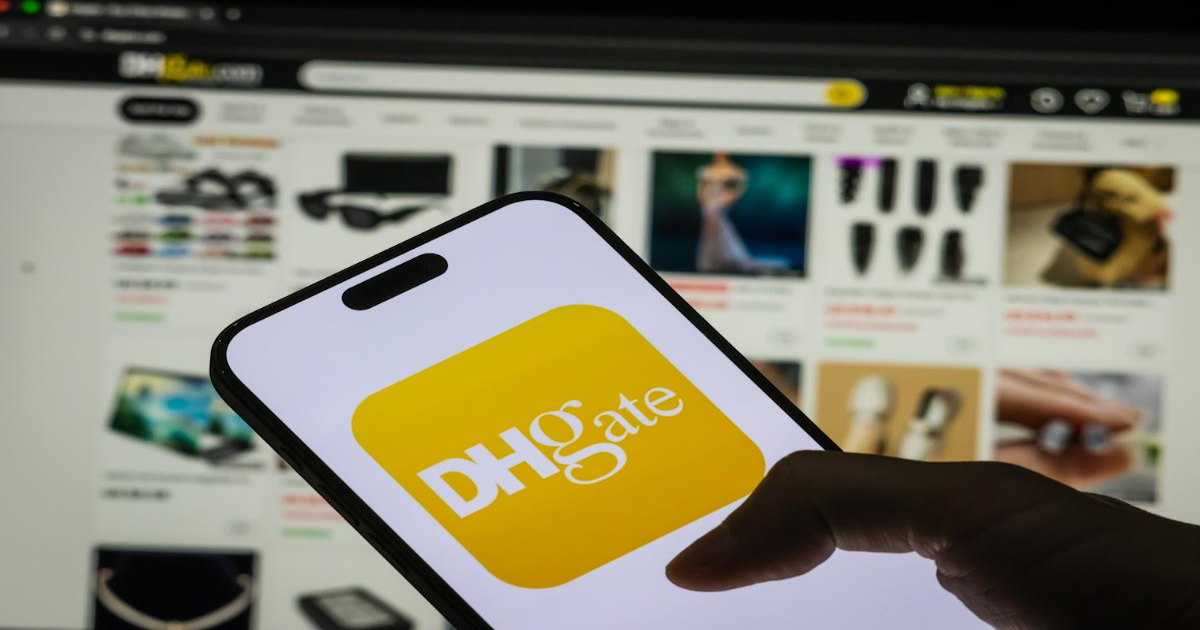In the days since President Trump announced he was increasing tariffs on Chinese imports to 145%, on April 10, a Chinese e-commerce app called DHgate has soared to the top of Apple’s U.S. App Store.
DHgate is an online marketplace predominantly known for selling knockoffs of high-end retail brands. As of last week, the app was the 352nd most downloaded free app in the iPhone’s U.S. app store, but on Tuesday it skyrocketed to second place.
App intelligence provider Appfigures told TechCrunch that on April 12, the DHgate app was downloaded over 35,000 times across Apple’s App Store and Google Play; roughly 17,300 of those downloads were in the U.S. specifically.
DHgate is not the first Chinese e-commerce app to draw interest from U.S. users. Temu, a Chinese online marketplace known for selling a wide array of products at low prices, similar to Amazon, was the most downloaded e-commerce app in the U.S. in 2024 for both iOS and Android devices, with over 86 million downloads last year alone; Shein, another Chinese platform that specializes in women’s fast fashion, is the second most downloaded shopping app in the U.S., with around 23 million downloads from the App Store and over 13 million from Google Play last year.
“We are grateful yet remain humble about this phenomenal surge in traffic,” a DHgate spokesman told the South China Morning Post on Tuesday. “As a company with deep roots in cross-border e-commerce, our focus remains on enhancing digital trade experiences for global consumers.”
What is DHgate?
DHgate describes itself as a cross-border e-commerce platform based in China. It boasts 59.6 million registered buyers across 255 countries and regions and offers over 37 million products for purchase and distribution. Diane Wang, the founder and CEO of DHgate Group, established the company in 2004 after holding senior management positions at Microsoft and Cisco, according to her LinkedIn profile.
The app itself looks and operates similarly to other popular Chinese retail sites like Shein and Temu, but DHgate is a wholesale marketplace that sells items directly from Chinese manufacturers and sellers to retailers and individual shoppers worldwide.
DHgate sells everything from jewelry to home goods to electronics to pet supplies, and it frequently features sale promotions and automatic discounts on already inexpensive products. But what DHgate is perhaps best known for in the U.S. is its selection of “dupes,” or cheaper copies of high-end, brand-name items.
“On DHgate, shoppers can easily find imitations of Goyard handbags priced around US$20, compared with originals that exceed US$4,000, as well as yoga pants similar to those from Lululemon for around US$10,” the South China Morning Post reported.
It is generally legal to buy items from DHgate as long as they’re not advertised with a brand logo or name, which would then classify them as counterfeit.
What’s behind the recent U.S. interest in DHgate?
Trump’s latest tariffs announcement seems to have inspired several TikTok users to advocate for Chinese manufacturing and encourage Americans to shop at DHgate.
In recent days, TikTok users from both China and the U.S. have posted videos promoting DHgate as a good source for buying cheap but expensive-looking products. Many creators in China, like @lunasourcingchina, have started filming tours of factories that produce products for popular U.S.-based brands like Estée Lauder, Tommy Hilfiger and Brooks Brothers.
The argument behind these videos is that a lot of these high-end Western products are mostly made in Chinese factories and then sent to the U.S. or Europe to be repackaged before being sold there at higher prices. These creators are asking Americans, why not just buy luxury items directly from the source for less money?
“There’s nothing a Chinese factory can’t make,” @lunasourcingchina said in one video that got over 3.6 million views in three days. “Factories in this region are beloved by those world top brands.”
DHgate isn’t exempt from Trump’s tariffs
Earlier this month, Trump signed an executive order ending the “de minimis exemption” for shippers, which allowed items and packages that were valued at $800 or less to enter the U.S. duty-free and with minimal inspections. The exemption, which marketplaces like Shein and Temu have relied on to sell and ship their cheap items internationally, is set to expire in May.
On Monday, Shein told its customers that it would be rolling out “price adjustments” starting April 25 due to “recent changes in global trade rules and tariffs.”
DHgate also addressed the tariffs in a statement on Monday.
“Expect slower shipping, more customs paperwork, and surprise fees unless you work with experienced freight forwarders,” the statement reads. “Despite the recent U.S. tariff restrictions, China is still the number one destination to source high-quality, low-cost goods.”
